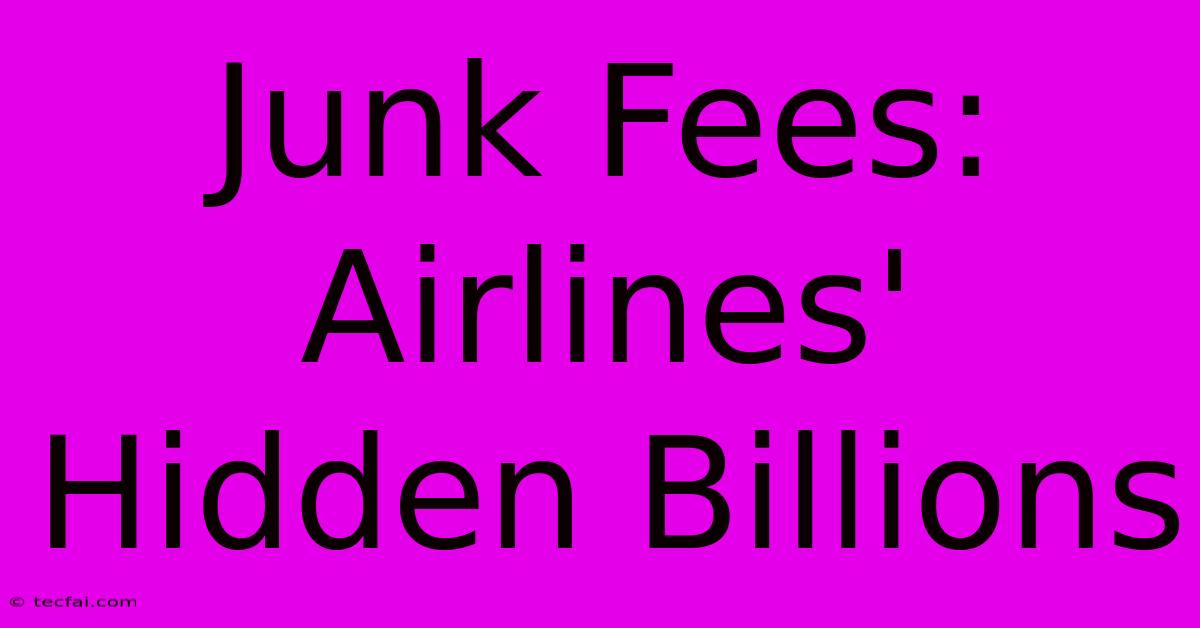Junk Fees: Airlines' Hidden Billions

Discover more detailed and exciting information on our website. Click the link below to start your adventure: Visit Best Website tecfai.com. Don't miss out!
Table of Contents
Junk Fees: Airlines' Hidden Billions
Airlines are notorious for nickel-and-diming passengers, generating billions in revenue through what many consider to be deceptive "junk fees." These extra charges, often hidden deep within the booking process, inflate the final cost of air travel significantly, leaving consumers feeling frustrated and misled. This article delves into the world of airline junk fees, exploring their impact on consumers and the ongoing efforts to regulate this increasingly lucrative practice.
The Anatomy of Airline Junk Fees
Airlines cleverly disguise these fees under various names, making it difficult for passengers to anticipate the true cost of their flight. Some common culprits include:
Baggage Fees:
- Checked Baggage: Charging exorbitant fees for checked bags, often exceeding the cost of the flight itself for larger or multiple bags. Budget airlines are particularly infamous for this practice.
- Overweight/Oversized Baggage: Penalties for bags exceeding weight or size limits are another significant revenue stream.
Seat Selection Fees:
- Standard Seating: Even selecting a standard seat can now attract a fee, forcing passengers to pay extra for a guaranteed spot.
- Preferred/Premium Seating: Upgraded seats come with hefty surcharges.
Change/Cancellation Fees:
- Flight Alterations: Modifying your booking, even for minor changes, frequently incurs steep fees.
- Cancellation Fees: Canceling your flight often results in significant financial losses, even with travel insurance.
Other Fees:
- In-Flight Wi-Fi: Accessing internet connectivity during your flight often necessitates a costly add-on.
- In-Flight Meals/Beverages: While some airlines include these in the ticket price, many charge separately, adding to the final bill.
- Priority Boarding: Paying extra for expedited boarding can seem tempting, but adds yet another fee to the overall travel expense.
The Billions Behind the Fees
The sheer volume of these fees translates into billions of dollars in revenue annually for airlines. While the airlines justify these charges by claiming they help offset operational costs, many argue that these fees are disproportionately high and represent an unethical exploitation of consumers. The lack of transparency surrounding these fees further exacerbates the issue.
Consumer Impact and Regulatory Efforts
The cumulative effect of these fees disproportionately impacts budget travelers, forcing many to make difficult choices or forgo travel altogether. The hidden nature of these charges prevents consumers from making informed decisions and effectively comparing flight prices.
Governments and consumer advocacy groups are increasingly recognizing the need for greater transparency and regulation. Several proposals are underway to mandate clearer disclosure of all fees upfront during the booking process, providing consumers with a more accurate picture of the total travel expense. These regulatory efforts aim to curb the airlines' reliance on junk fees and empower consumers to make informed choices.
Fighting Back Against Junk Fees
As consumers, we can collectively push for change by:
- Researching thoroughly: Compare total prices including all fees before booking.
- Choosing airlines wisely: Prioritize airlines with more transparent pricing structures and fewer hidden fees.
- Contacting your representatives: Support legislation aimed at regulating airline junk fees.
- Sharing your experiences: Publicly sharing your experiences with airline junk fees can help raise awareness and pressure airlines to change their practices.
The fight against airline junk fees is ongoing, but with collective action and increased regulatory pressure, there's hope for a more transparent and fair system. By understanding the mechanics of these fees and advocating for change, passengers can collectively reduce the billions of dollars lost annually to these unnecessary and often deceptive charges.

Thank you for visiting our website wich cover about Junk Fees: Airlines' Hidden Billions. We hope the information provided has been useful to you. Feel free to contact us if you have any questions or need further assistance. See you next time and dont miss to bookmark.
Featured Posts
-
Morrisons Facing Product Shortages
Nov 27, 2024
-
Senate Slams Airline Junk Fees
Nov 27, 2024
-
Olgs 80 M Lotto Max On Tuesday
Nov 27, 2024
-
Blue Snap Faces Irish Bank Penalty
Nov 27, 2024
-
Six Goal Draw Hibs Share Points
Nov 27, 2024
